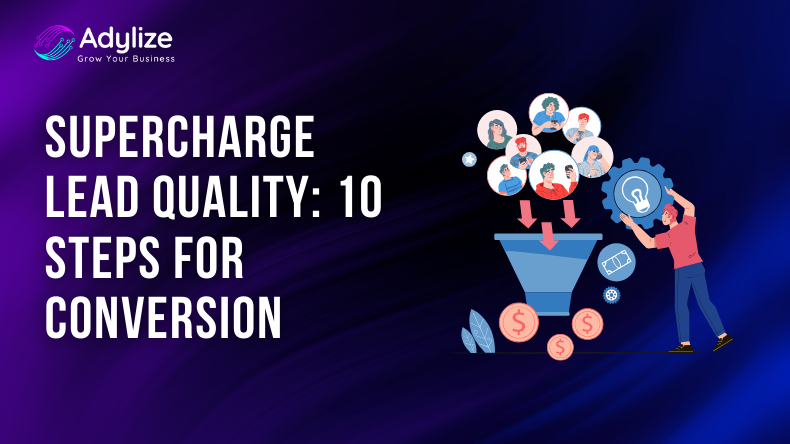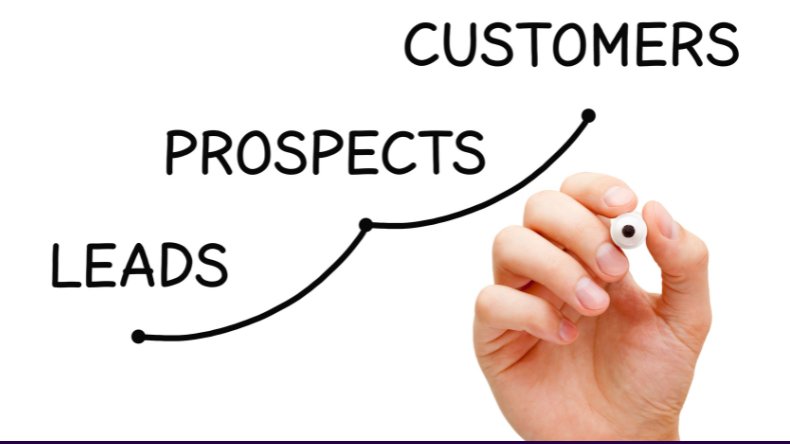
Supercharge Lead Quality: 10 Steps For Conversion
Introduction: Supercharge Lead Quality: 10 Steps For Conversion
In the competitive landscape of modern business, generating leads is crucial for sustained growth and success. However, simply amassing a large number of leads is not enough; what truly matters is the quality of those leads. High-quality leads have a genuine interest in your product or service, making them more likely to convert into paying customers. In this article, we’ll explore the strategies and best practices for improving lead quality, helping businesses focus their efforts on prospects with the highest potential for conversion and revenue generation.

Let’s discuss about how to Supercharge Lead Quality: 10 Steps For Conversion
1. Building a Strong Bridge Between Marketing and Sales Teams
Effective collaboration between marketing and sales teams is pivotal for lead qualification. The marketing team’s role is to identify and nurture leads until they are ready to be passed on to the sales team. This involves not only generating leads but also qualifying them to ensure they meet certain criteria.
Marketing Qualified Leads (MQLs) are those prospects who have shown genuine interest and engagement with the brand, making them more likely to convert into customers. Once these leads are identified, they are passed on to the sales team, who further qualify them as Sales Qualified Leads (SQLs) based on their potential to make a purchase. By maintaining a strong connection between marketing and sales teams, businesses can ensure that only the most promising leads are pursued, increasing the likelihood of conversion.
2. Implementing Effective Lead Scoring Methodology
Lead scoring is a process used to evaluate and rank leads based on their likelihood of converting into customers. This involves assigning a score to each lead based on various factors, such as their level of engagement with the brand, their demographic information, and their behavior on the website. Leads are then categorized into different segments based on their scores, with higher-scoring leads considered more likely to convert. By focusing their efforts on leads with higher scores, businesses can prioritize their resources and maximize their chances of success.

3. Developing Targeted Lead Nurturing Campaigns
Lead nurturing is the process of building relationships with leads over time in order to guide them through the sales funnel. This involves providing valuable content and information to prospects at each stage of the buying journey, helping to address their needs and concerns and ultimately encouraging them to make a purchase. Effective lead nurturing campaigns can significantly increase the number of Sales Qualified Leads (SQLs) generated, as well as reduce the cost per lead acquisition. By providing personalized and targeted content to leads based on their interests and preferences, businesses can increase engagement and ultimately drive more conversions.
4. Establishing a Seamless Marketing-Sales Feedback Loop
A seamless feedback loop between marketing and sales teams is essential for optimizing lead quality. This involves regular communication and collaboration between the two teams, ensuring that they are aligned in their goals and objectives. Marketing teams should provide sales teams with valuable insights and information about leads, while sales teams should provide feedback on the quality of leads and the effectiveness of marketing efforts. By sharing information and insights, both teams can work together to identify areas for improvement and optimize their lead-generation strategies.

5. Leveraging Advanced Marketing Automation Tools
In today’s digital age, marketing automation tools are essential for streamlining lead-generation processes and maximizing efficiency. These tools can help businesses track and analyze lead behavior, segment leads based on various criteria, and automate repetitive tasks such as email marketing and lead scoring. By leveraging the power of marketing automation, businesses can save time and resources, improve lead quality, and ultimately drive more sales and revenue.
6. Utilizing Data Analytics for Continuous Improvement
Data analytics play a crucial role in optimizing lead quality and conversion rates. By analyzing data from various sources, including website analytics, email campaigns, and customer interactions, businesses can gain valuable insights into lead behavior and preferences. This data can be used to identify patterns and trends, refine targeting strategies, and personalize marketing efforts. By leveraging data analytics, businesses can continuously monitor and improve their lead generation efforts, ensuring that they are always adapting to changing market conditions and customer needs.

7. Personalizing the Customer Experience
Personalization is key to improving lead quality and driving conversions. By tailoring marketing messages and offers to the specific needs and preferences of individual leads, businesses can increase engagement and build stronger relationships with prospects. This can be achieved through various means, including personalized email campaigns, targeted advertising, and customized content. By delivering relevant and timely messages to leads, businesses can create a more positive and memorable customer experience, ultimately increasing the likelihood of conversion.
8. Conducting A/B Testing and Experimentation
A/B testing, also known as split testing, is a method of comparing two versions of a webpage, email, or other marketing asset to determine which one performs better. By conducting A/B tests, businesses can identify the most effective messaging, designs, and strategies for engaging leads and driving conversions. Experimentation is key to continuous improvement, allowing businesses to test new ideas and iterate on existing ones to optimize their lead-generation efforts.
9. Providing Exceptional Customer Service
Exceptional customer service is essential for building trust and loyalty with leads and customers alike. By providing prompt and helpful responses to inquiries, addressing concerns and complaints quickly and effectively, and going above and beyond to exceed expectations, businesses can create a positive impression and increase the likelihood of conversion. Excellent customer service can also lead to referrals and repeat business, further increasing the value of each lead.
10. Monitoring and Adjusting Strategies as Needed
Finally, it’s essential for businesses to continually monitor and adjust their lead generation strategies based on performance metrics and feedback. By tracking key metrics such as conversion rates, cost per lead, and customer lifetime value, businesses can identify areas for improvement and make data-driven decisions to optimize their efforts. Flexibility and agility are crucial in today’s fast-paced business environment, allowing businesses to adapt to changing market conditions and customer preferences quickly.
Conclusion: Driving Success Through Quality Leads
In conclusion, improving lead quality is essential for driving success and growth in today’s competitive business landscape. By implementing the strategies and best practices outlined in this article, businesses can effectively identify, nurture, and convert high-quality leads into paying customers. By building strong relationships with prospects, leveraging advanced technology, and maintaining open communication between marketing and sales teams, businesses can maximize their lead-generation efforts and achieve their goals. With a focus on quality over quantity, businesses can position themselves for long-term success and sustainable growth in the marketplace.


